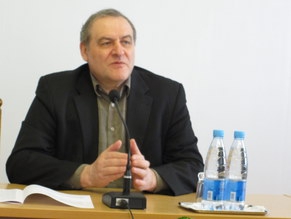|
Euroasian Jewish News

Report of famous human rights activity, KHPG leader Evgeniy Zakharov
|
Xenophobia Studies Presented in Kyiv
25.04.2012 On April 25, the Grand Conference Hall of the National Academy of Sciences of Ukraine held a presentation by the Kharkiv Human Rights Protection Group (KHPG). The KHPG presented the results of its monitoring of hate crime in Ukraine, completed with the support of the German Foundation Remembrance, Responsibility and Future (EVZ).
Unfortunately, because of technical problems connected to actions of the authorities towards the bank keeping the KHPG accounts, it had been impossible to publish the book that had been planned as a result of the project. However, the KHPG still managed to publish a short booklet containing the concise results of the study. The booklet, titled “An Analysis of the Legislation and Legal Practice on Countering Hate Crime” (authors Batchayev V., Zakharov E., Martynenko O., Shvets S. Published in Kharkiv, in April 2012), was presented at the conference.
The presentation took the form of a round table, which allowed for the exchange of opinions on ways to counter hate crime between representatives of a variety of community organizations protecting the rights of LBGT groups, national minorities, refugees, and seekers of political asylum.
The discussion was opened by the KHPG leader, famous human rights activist Evgeniy Zakharov. In his speech, he stressed that one of the main problems on countering xenophobia in Ukraine is the denial of law enforcement agencies to adequately qualify hate crime. This is in connection both with the imperfection of the existing legislative framework and the reluctance of the police and prosecutor's office to use even those instruments that exist in the current Criminal Code.
The authors of the study – Vladimir Batchayev, Oleg Martynenko, and Sergei Shvets – shared their opinions on the causes of this problem. The researchers drew attention to the inadequate response of the problem of law enforcement agencies and the government in general, which often themselves become the source of discriminatory and xenophobic actions.
The discussion also raised questions about the definition of discrimination and hate crime, methodology of monitoring, changes in the legislative framework, and aid to those who had come to harm through xenophobic offenses.
Among those who took part in the discussion were Yana Salakhova (International Organization for Migration), Sergei Ponomaryov (Coalition Against Discrimination), Iryna Fedorovich (Project “Without Borders” of the Social Action Center), and others.
EAJC General Council Member Vyacheslav Likhachev (EAJC) in his report grave the statistic for hate crime that he has collected as a result of the long-term EAJC project on monitoring xenophobia. Unfortunately, it can be said that despite the important information and recommendations, based on this information, that are includen in the KHPG report, a fully functional monitoring system for hate crime did not come into being as a result of this project.
|
